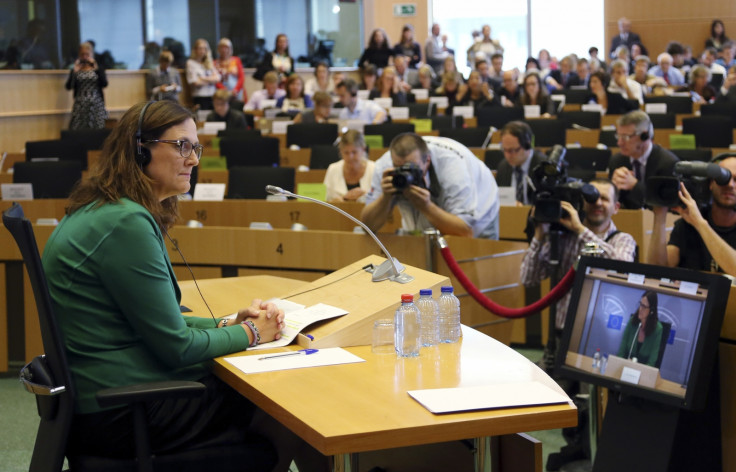TTIP: Trade Commissioner Malmström Warns Deal Shouldn't Undermine National Government as ISDS Opposition Spreads

The free trade agreement between the EU and US should not undermine governments' ability to make local rules over standards and public services, the European Trade Commissioner has said in one of her first speeches on the topic.
Cecilia Malmström, who officially acceded to the role on 1 November, told a public debate in Brussels that no EU trade agreement should stop member states from organising its health or education system, in response to fears that the Transatlantic Trade and Investment Partnership (TTIP) will lead to the privatisation of public utilities and health services.
She said that negotiations are being dealt with using caution, but also urged for the EU to be ambitious in pursuing the largest free trade agreement in history.
"Caution alone, however, will miss other opportunities to help consumers get what they need from government. We need ambition here too. Ambition means using regulatory cooperation to boost sharing of knowledge and best practices between our highly talented regulators. That will lead to better results for citizens," she said.
Malmström echoed the views of UK Prime Minister David Cameron who has promised to "fire rocket boosters" under TTIP in order to get the deal over the line. Cameron, who said the deal could be worth £10bn to the UK economy, also forcefully denied claims that TTIP would lead to privatisation of the NHS.
"It's our NHS, it's in the public sector, it will stay in the public sector, it will remain free at the point of use," he said, adding that the criticisms of the deal were "weak" and "nonsense".
Malmström refused to speculate on plans for the controversial investor-state dispute settlement (ISDS) clause which has threatened to derail the agreement, saying that the Commission is still processing the results of a public consultation held by her predecessor Karel De Gucht earlier this year.
ISDS is the tenet of international trade law that allows an investor the right to take a foreign government to dispute settlement proceedings, usually when the host state violates the rights granted to the investor.
Earlier in the week, ISDS caused further consternation in Europe when the French Secretary of State for Foreign Trade Matthias Fekl said France would not support its inclusion in TTIP.
Speaking to the French Senate, he said: "France did not want the ISDS to be included in the negotiation mandate. We have to preserve the right of the state to set and apply its own standards, to maintain the impartiality of the justice system and to allow the people of France, and the world, to assert their values."
With the German Minister for Economic Affairs, Sigmar Gabriel, also opposed to the clause, it means that senior officials in the EU's two largest economies are lobbying to have it removed from discussions.
Gabriel has, under pressure from the left of his Social Democratic Party (SPD), been pressing the Commission to remove it from negotiations and it's understood that there are many areas of the German economy which he wants to see exempted from the clause, spanning environmental, labour and social issues.
However, at a joint press conference with Malmström last week he seemed to concede that only minor adjustments could be made to the ISDS clause included in the EU-Canada trade deal (Ceta), which has already been finalised and will pass to local parliaments and the European Parliament for ratification in 2015.
He said: "It will not be possible to take the dispute settlement procedure out of Ceta. We are acting in a European context and must listen to the views of other countries."
Meanwhile, in an interview with World Trade Online, a senior EU trade official doubted whether a TTIP that includes ISDS would be successfully passed through the European Parliament. Bernd Lange, the German head of the European Parliament's International Trade Committee (INTA) said: "It would be really a mess if a quite good agreement would fail because of ISDS. That shouldn't happen."
© Copyright IBTimes 2025. All rights reserved.






















